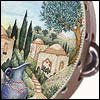We sat in a circle, eyes closed. All was dark except for the glow of the small candle burning on the desk in the middle of the room.
Our teacher began to sing, “Yahy dai dai dai dai dai.” Slowly, but surely, the group of students picked up the tune. At first, I felt a bit uncomfortable. I let out a small giggle intended for my friend sitting next to me. After some muffled laughter, we both silently decided to concentrate on the singing.
Soon no one was there but the music and me. I felt carried away in song. I heard my voice aloneI closed my eyes more tightly and listened. The music became more familiar, the repetition of the melody got stuck in my head. I knew where the song was headed next. I anticipated the low notes at the beginning and the high notes in the middle. Soon, no one was there but the music and me. I felt carried away in song. I heard my voice alone. Then I heard it surrounded by everyone else. We were in unison. Individual voices sang the same melody. No real words backed up our song. There were no words that could. I wanted to sing forever.
It was over too soon. We opened our eyes. No one said anything.
“How do you feel?” she asked.
“I feel relaxed,” said one student.
“Everything feels more in focus,” said another.
It was true. My eyes highlighted the soft glow of the candlelight on the faces around me. I heard the steady hum of the room and the murmured sounds of people walking outside. I felt the comfortable cushion beneath me. My senses took in the moment in slow motion.
Our teacher smiled. She told us the song was called a niggun. A niggun, she continued, is a song without words. It was a powerful form of Jewish meditation.
Even now, years later, the tune of that melody is still in my head. I access it when I need to unwind. I connect to it like the words of a lover’s poem. Yet it went beyond what words could express. It was as if the rhythm of my soul could be found in between the notes.
What was it about the niggun that drew me in? I wondered. What is it about music that is so alluring?
The more I thought about it, the more I realized the importance of music. When someone likes the same music I do, I bond with them. When “my" song is playing, I want to dance. When a song has good lyrics, I often quote it.
Movies utilize music all the time. Re-examining the emotionally gripping scenes that have made me cry, I discovered that it wasn’t so much the action of the movie but the tearful music in the background that dictated my reaction. I realized, even when I’m not cognizant that there is music around me, it affects me nevertheless.
Music is everywhere. The owl hooting in the silence of the night, the tip tap tap of my keyboard, and the whooshing of flowing water are life’s music.
Music connects me to my past, present and futureI don’t just hear music. I use it. At the gym, the upbeat songs I play on my iPod get me moving. If it was not for the rhythm of the beat, I would not be able to run as fast. My friends feel the same way. They are always looking for new workout playlists.
Music connects me to my past, present and future. I’ll hear a song and suddenly, I’m back in my friend’s car, singing uninhibitedly, on our way to school. Sometimes, I’ll be in a certain mood and crank up a song that echoes my emotions. Other times I will listen to a song and hope that I will one day feel the way the singer does.
Music transcends language. Perhaps that is why mothers sing to their babies. The sound of their mother’s voice soothes their cries when nothing else will. Sometimes, the baby will even smile. Why does a song bring joy when we fail to comprehend the words behind it?
Miriam, Moses’s sister, illustrates the answer to these questions. She brought along a tambourine when the Jews escaped Egypt. Why would anyone pack an instrument in their bag—something that isn’t necessary for survival in the desert—when she could have packed something a little more substantial? I would have chosen to pack more matzah!
Miriam had faith that G‑d would save her people from Egyptian slavery. Music conveys emotion too difficult for even our conscious minds to comprehend. It is beyond the rational. It is something more—and that is how it can connect us to something beyond ourselves.
When the Jews crossed the Sea of Reeds and the Egyptians did not, Miriam whipped out her tambourine. She played, sang and danced with the other women. The music they played symbolized their faith and their joy more than words could ever express. Perhaps only music can adequately convey the feelings of shock and the utter excitement we felt from being freed from slavery. There were no words for our mixed emotions and so, we sang. In song, our individual experiences get expressed in a unified way. We understand that the song that is the human experience connects us even when our stories may be somewhat different.
An even stronger reason for Miriam’s song was the connection she must have felt at this moment. G‑d was now keeping His promise that He would create the Jewish nation. We had just gone from slavery to freedom. Singing represents movement and newness. This is essentially, the power of creation.
Sound is not finite. It can’t be written down and thus, can never dieSound is not finite. It can’t be written down and thus, can never die. Written words are stagnant whereas spoken words are moving. Sound is a link to the eternal. It connects us to G‑d.
According to Torah, the earth was created in seven days. There are seven notes on the musical scale. Seven is a very special number in Judaism; it represents completion. Seven symbolizes the spiritual reality of the physical world.
Maybe that is the reason for music’s power to make us happy, relax us, and add meaning to our lives. When we listen to music, we connect to something beyond ourselves. We feel united with other human beings and to our deepest selves as souls. Judaism teaches that the mouth, the instrument of our bodies, connects the heart with the soul. When we join body with soul, we are complete. The music creates a state where we are in tune with our essential spiritual selves and can feel united with our Creator.
At its essence, music can be an expression of prayer. Perhaps this is why the Hebrew word for prayer, tefilla, and the word for song, shira have the same numerical equivalent. Through song we can access the true yearnings of our soul, our prayers.
The most famous musical prayers are King David’s psalms. Interestingly enough, the last psalm tells us to praise G‑d with music. Jewish prayers are set to music because it is impossible to put into words what we truly are praying for. Sometimes, when praying, I don’t know what to say to G‑d. All I can muster is “please help me.” Music expresses that longing to say what is in my heart.
Music is the language of the heart and soulMusic is the part of myself I may not comprehend but when I connect to it, I feel whole. It’s not the words that matter. Words can limit our understanding. Music is deeper than words. Music is the language of the heart and soul. Music brings us to an entirely new and deeper dimension of our connection with our Maker.
Although music is always there, sometimes we need to remind ourselves to listen. When we tune into our hearts, we lift our spirits and feel empowered. Suddenly, like when I experienced that power of the niggun, we elevate ourselves to higher frequencies than our limited understanding of the world. We move to a new beat.







Join the Discussion